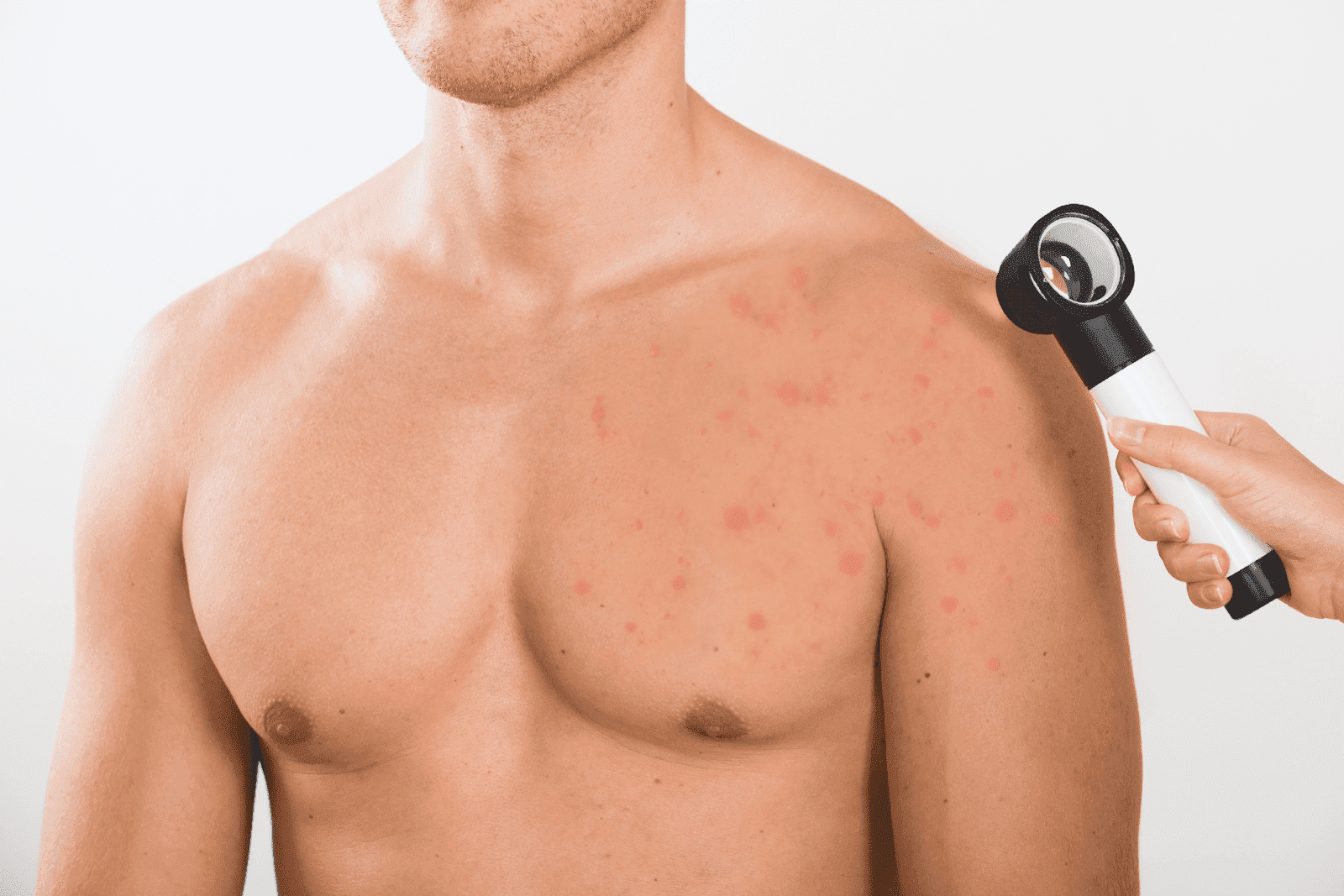Chest acne is a common skin concern that affects people of all ages. While acne is often associated with the face, it can also appear on the chest, back, and shoulders, causing discomfort and self-consciousness. Understanding the causes of chest acne and exploring effective treatment options can help you manage this condition and maintain healthy skin.
 Understanding Chest Acne: Causes and Contributing Factors
Understanding Chest Acne: Causes and Contributing Factors
Chest acne occurs when hair follicles become clogged with oil, dead skin cells, and bacteria. The chest area has numerous sebaceous glands that produce sebum, an oily substance meant to protect and moisturize the skin. However, excess sebum production can lead to clogged pores and inflammation, resulting in acne.
Several factors can contribute to the development of chest acne:
Hormonal Changes
Hormonal fluctuations, especially during puberty, menstruation, pregnancy, or periods of high stress, can increase sebum production. This hormonal imbalance often triggers acne outbreaks not only on the face but also on the chest and other parts of the body. For instance, during puberty, the body undergoes significant hormonal changes that can lead to increased oil production, making adolescents particularly susceptible to acne. Similarly, hormonal contraceptives can also influence acne patterns, either alleviating or exacerbating breakouts depending on the individual’s unique hormonal profile.
Friction and Sweat
Wearing tight clothing, especially fabrics that do not breathe well, can trap sweat and irritate the skin. This friction, combined with sweat, creates an environment where bacteria thrive, leading to clogged pores and acne. Activities such as working out or spending time in hot, humid conditions can exacerbate this. It’s important to choose breathable fabrics, such as cotton or moisture-wicking materials, to help reduce the risk of developing acne in these areas. Additionally, showering promptly after sweating can help remove excess oil and bacteria, minimizing the chances of breakouts.
Skincare and Hygiene Habits
Using heavy lotions, oils, or certain body washes can sometimes clog pores on the chest. Additionally, infrequent washing or not removing sweat promptly can worsen acne. On the other hand, over-washing or using harsh scrubs may irritate the skin and make acne worse. Finding a balance in skincare is crucial; opting for non-comedogenic products that are specifically formulated to avoid clogging pores can be beneficial. Regular exfoliation, performed gently, can also help to remove dead skin cells and prevent buildup, but it should be done with care to avoid irritation.
Diet and Lifestyle
While the relationship between diet and acne is still being studied, some individuals notice that high-glycemic foods, dairy, or excessive consumption of processed foods can aggravate their acne. Maintaining a balanced diet and staying hydrated supports overall skin health. Incorporating foods rich in antioxidants, such as fruits and vegetables, may help combat inflammation and promote clearer skin. Furthermore, lifestyle factors like stress management and adequate sleep are essential; chronic stress can lead to hormonal changes that exacerbate acne, while proper rest allows the body to repair and rejuvenate the skin.
Recognizing Chest Acne: Symptoms and Types
Chest acne can manifest in various forms, from small whiteheads and blackheads to painful cysts and nodules. Common symptoms include:
Red, inflamed bumps or pustules
Whiteheads or blackheads
Itching or tenderness in the affected area
Occasional scarring or dark spots after healing
Unlike facial acne, chest acne can sometimes be more stubborn due to the thicker skin and larger pores in this area. Early treatment is important to prevent scarring and reduce discomfort.
In addition to the physical symptoms, chest acne can also have an emotional impact. Many individuals feel self-conscious about breakouts on their chest, especially during warmer months when clothing is lighter and more revealing. This can lead to a decrease in confidence and social interactions, as people may avoid situations where they feel their skin is on display. Understanding the psychological effects of chest acne is crucial for those who experience it, as it can influence their overall well-being and body image.
Furthermore, the causes of chest acne can vary widely. Factors such as hormonal fluctuations, excessive sweating, friction from clothing, and even certain skincare products can contribute to its development. For instance, individuals who engage in regular physical activity may find that sweat and tight-fitting workout gear exacerbate their condition. Identifying and addressing these underlying triggers is essential for effective management and prevention of future breakouts.
Effective Treatment Options for Chest Acne
Managing chest acne involves a combination of lifestyle adjustments, skincare routines, and sometimes medical interventions. Here are some of the most effective strategies:
Over-the-Counter Topical Treatments
Products containing benzoyl peroxide, salicylic acid, or alpha hydroxy acids can help reduce inflammation and unclog pores. These ingredients work by killing acne-causing bacteria, exfoliating dead skin cells, and reducing oiliness. When using these products, start with lower concentrations to minimize skin irritation.
Proper Skincare Routine
Maintaining a gentle skincare routine is essential. Use a mild, non-comedogenic body wash daily, especially after sweating. Avoid scrubbing the chest area harshly, as this can worsen irritation. Moisturizing with a lightweight, oil-free lotion can help maintain skin balance without clogging pores.
Clothing Choices
Opt for loose-fitting, breathable fabrics such as cotton to reduce friction and allow the skin to breathe. Change out of sweaty clothes promptly after exercise or outdoor activities to prevent pore blockage.
Medical and Prescription Treatments
If over-the-counter options are not effective, consulting a healthcare professional is recommended. Prescription topical treatments like retinoids or antibiotics may be necessary for more severe cases. Oral medications, including antibiotics or hormonal therapies, might also be prescribed depending on the underlying cause.
When to Seek Professional Help
Persistent or severe chest acne that does not respond to home treatments warrants medical evaluation. Additionally, if acne is accompanied by significant pain, swelling, or signs of infection, professional care is important to prevent complications.
Telehealth services have made accessing medical advice easier and more convenient. Doctronic.ai offers affordable and accessible telehealth video visits with licensed doctors 24/7 across all 50 states. This service allows patients to discuss their skin concerns, receive personalized treatment recommendations, and obtain prescriptions without leaving home. Over 10 million people have trusted Doctronic's AI-powered platform to get fast, smart, and personal medical care.
Additional Tips for Preventing Chest Acne
Prevention is often the best approach to managing chest acne. Here are some helpful tips:
Shower promptly after sweating to remove excess oil and bacteria.
Avoid using heavy body lotions or oils that can clog pores.
Keep hair clean and off the chest to prevent oil transfer.
Maintain a balanced diet rich in fruits, vegetables, and water.
Manage stress through relaxation techniques such as meditation or exercise.
Regularly monitoring your skin and adjusting habits can significantly reduce the frequency and severity of chest acne outbreaks.
The Role of AI in Modern Dermatology and Telehealth
Advancements in artificial intelligence (AI) are transforming how patients access healthcare and manage conditions like chest acne. AI-powered platforms synthesize the latest peer-reviewed medical research to provide accurate, up-to-date information quickly. Unlike generic internet searches, these systems offer personalized insights based on an individual’s history and symptoms.
Doctronic.ai exemplifies this innovation by combining AI with human medical expertise. The platform offers free AI doctor visits that provide instant, comprehensive answers to health questions, including skin concerns. Users can then follow up with telehealth video visits for tailored treatment plans. This approach ensures patients receive smarter, faster, and more personal care than ever before.
 Clearer Skin Starts with the Right Support
Clearer Skin Starts with the Right Support
Chest acne can be a frustrating and uncomfortable condition, but understanding its causes and treatment options empowers individuals to take control of their skin health. From hormonal changes and friction to skincare habits and lifestyle factors, multiple elements influence the development of chest acne.
Effective management includes gentle skincare, appropriate topical treatments, lifestyle adjustments, and seeking professional care when necessary. Telehealth services like Doctronic.ai provide accessible and affordable options for personalized medical advice and treatment, making it easier than ever to address chest acne and other health concerns.
By combining modern medical knowledge with innovative technology, managing chest acne has become more straightforward, allowing people to enjoy clearer, healthier skin with confidence.
Take Control of Your Chest Acne with Doctronic
Don't let chest acne hold you back from feeling confident in your skin. With Doctronic, you can access the #1 AI Doctor right from your home. Our AI-powered platform offers free, instant doctor visits that provide personalized treatment recommendations based on the latest medical research. If you need more in-depth care, our affordable telehealth video visits with licensed doctors are available 24/7 in all 50 states. Experience faster, smarter, and more personal healthcare today. Skip the line. Talk to an AI Doctor Now, for free.



 Understanding Chest Acne: Causes and Contributing Factors
Understanding Chest Acne: Causes and Contributing Factors Clearer Skin Starts with the Right Support
Clearer Skin Starts with the Right Support